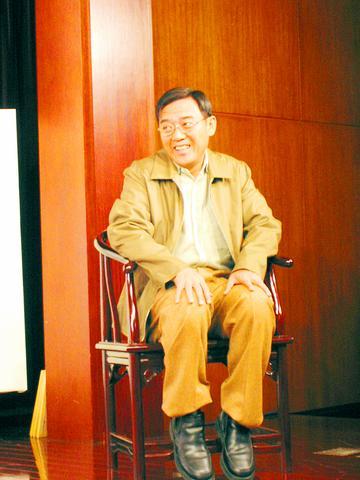The upcoming performance of Yasmina Reza's 1994 play Art by the Godot Theater Company has turned out to be something of a coup de theatre. Opening on Dec. 25 and originally scheduled for 16 performances in Taipei -- a long run by local standards. Tickets for the first seven performances are booked solid and only the most expensive remain for the rest.
Godot announced Tuesday that it would be returning for an additional six shows in Taipei in February after it has completed its countrywide tour. Tickets for these additional performances are also selling fast.

PHOTO: IAN BARTHOLOMEW, TAIPEI TIMES
Why the enthusiasm?
While Yasmina Reza has made something of a sensation in Europe and the US, she is a long way from theatrical greatness and while most reviews acknowledge her accessibility, they are also just a tad dismissive. A review in the British magazine The Spectator describes her as "intellectual theater lite."
While Art won the Moliere Award for Best Play, Best Production, and Best Author when it was first released, and has since proved popular in numerous translated productions, the real draw for Godot's production is that it features three of Taiwan's most distinguished comedians in a virtuoso peace of ensemble work.
The play has a cast of only three; but when these are Ku Bao-ming (
Each actor brings his own unique style to the show, and as director Liang Chih-ming (
The story is simple enough: Art is about the relationship between three friends, one who has bought an expensive modernist work. One of his friends despises him for this while the other tries to make peace between the two. What follows is a machine-gun battle of words, which is excruciatingly funning in its own right and is all the cleverer for the fact that most of the action is in the subtext. The modernist art work at the center of the debate serves merely as a catalyst for the three friends to assess their relationship -- hence the accusation of being "intellectual theater lite," for while it has pretensions to the high-brow, it is not rigorously intellectual.
While nobody will deny that Taiwan has theatrical talent, its perennial problem has been a lack of depth that tends to mar ambitious projects such as Ping-Fong's recent Wedding Memories, in which the stars absolutely overwhelm the rest of the cast. The small scale of the current production and the decision to cast three of the most highly sought after actors -- rather than letting one big name carry the publicity load for two lesser names -- has provided an opportunity to see some top-class action on stage.

On April 26, The Lancet published a letter from two doctors at Taichung-based China Medical University Hospital (CMUH) warning that “Taiwan’s Health Care System is on the Brink of Collapse.” The authors said that “Years of policy inaction and mismanagement of resources have led to the National Health Insurance system operating under unsustainable conditions.” The pushback was immediate. Errors in the paper were quickly identified and publicized, to discredit the authors (the hospital apologized). CNA reported that CMUH said the letter described Taiwan in 2021 as having 62 nurses per 10,000 people, when the correct number was 78 nurses per 10,000

As we live longer, our risk of cognitive impairment is increasing. How can we delay the onset of symptoms? Do we have to give up every indulgence or can small changes make a difference? We asked neurologists for tips on how to keep our brains healthy for life. TAKE CARE OF YOUR HEALTH “All of the sensible things that apply to bodily health apply to brain health,” says Suzanne O’Sullivan, a consultant in neurology at the National Hospital for Neurology and Neurosurgery in London, and the author of The Age of Diagnosis. “When you’re 20, you can get away with absolute

May 5 to May 11 What started out as friction between Taiwanese students at Taichung First High School and a Japanese head cook escalated dramatically over the first two weeks of May 1927. It began on April 30 when the cook’s wife knew that lotus starch used in that night’s dinner had rat feces in it, but failed to inform staff until the meal was already prepared. The students believed that her silence was intentional, and filed a complaint. The school’s Japanese administrators sided with the cook’s family, dismissing the students as troublemakers and clamping down on their freedoms — with

As Donald Trump’s executive order in March led to the shuttering of Voice of America (VOA) — the global broadcaster whose roots date back to the fight against Nazi propaganda — he quickly attracted support from figures not used to aligning themselves with any US administration. Trump had ordered the US Agency for Global Media, the federal agency that funds VOA and other groups promoting independent journalism overseas, to be “eliminated to the maximum extent consistent with applicable law.” The decision suddenly halted programming in 49 languages to more than 425 million people. In Moscow, Margarita Simonyan, the hardline editor-in-chief of the